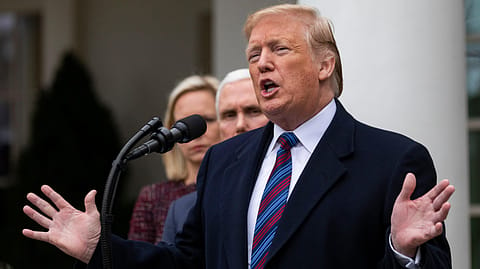Trump tariffs: Smartphones, computers, chips spared from 'reciprocal' duty
The move is expected to provide temporary relief to tech giants like Apple and Samsung, which manufacture these products outside the U.S., mostly in China.

Days after announcing three-month pause on all “reciprocal” tariffs, U.S. President Donald Trump's administration has exempted smartphones, computers, and other electronics from its proposed levy on imports.
As per the new guidance from U.S. Customs and Border Protection, issued late Friday evening, other electronic devices and components, including semiconductors, solar cells, flat panel TV displays, flash drives, and memory cards, will be also exempted from reciprocal tariffs.
These consumer electronics products will be excluded from Trump’s newly announced 125% reciprocal tariffs on Chinese imports, the notification noted.
On April 10, President Trump announced a complete three-month pause on all the reciprocal tariffs, with the exception of China. The U.S. had earlier announced a 10% baseline tariff on almost all imports effective April 5, 2025, and a higher 26% tariff specifically on Indian goods, effective April 9, 2025.
Move to provide temporary relief to Apple, Samsung
According to updated guidance from U.S. Customs and Border Protection, the electronics products would be excluded from Trump's 10% global tariff on most countries and the much higher import tax on China. The move is expected to provide temporary relief to tech giants like Apple and Samsung, which manufacture these products outside U.S., mostly in China.
Reports suggest that around 80% of Apple's iPhones intended for U.S. sale are made in China, and the remaining 20% are manufactured in India. With the White House imposing staggering tariffs—effectively 145%—on all Chinese imports, the cost implications for Apple and its consumers are profound.
Recommended Stories
Fortune India in a recent report said that Apple, the ubiquitous force in global consumer tech, would face global supply chain after the White House imposed staggering tariffs on all Chinese imports. The iPhone maker is heavily dependent on custom and often single-source components. As disclosed in its latest annual report, while most essential components are generally available from multiple sources, certain key parts—especially custom ones used in new technologies—are sourced from a single or limited set of suppliers. Initial capacity constraints, pricing fluctuations, and industry-wide shortages frequently affect availability.
Furthermore, Apple competes for many of these inputs with other global players across smartphones, PCs, wearables, and accessories. This concentration risk means that any disruption or strategic redirection by suppliers could leave Apple vulnerable—more so now as it juggles rising tariffs and production relocation plans.
Earlier this week, iPhone maker Apple reportedly chartered cargo flights to ship 600 tonnes of iPhones, or as many as 1.5 million devices, to the United States from India in circumvent tariffs announced by U.S. President Donald Trump's tariffs.